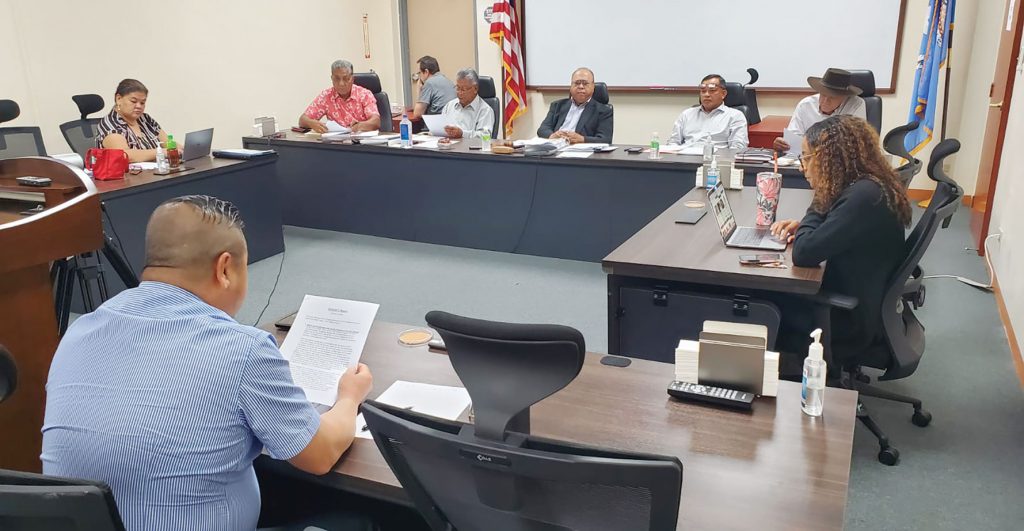‘CCC 9th Circuit appeal seeks to prevent setting wrong precedent’
Commonwealth Casino Commission executive director Andrew Yeom talks about his report during the CCC board’s monthly meeting at the Springs Plaza Building in Gualo Rai Thursday. Among the topics that Yeom discussed was the CCC’s appeal to the U.S. Court of Appeals for the Ninth Circuit, in reference to the U.S. District Court for the NMI’s ruling that granted Imperial Pacific International (CNMI) LLC’s motions for preliminary injunction and to compel arbitration. (FERDIE DE LA TORRE)

The most important reason why the Commonwealth Casino Commission has appealed to the U.S. Court of Appeals for the Ninth Circuit the recent decision of the U.S. District Court for the NMI to grant Imperial Pacific International (CNMI) LLC’s request for preliminary injunction is because they do not want to set a wrong precedent that the federal court’s decision may pave the way for deciding subsequent cases involving identical or similar facts, or similar legal issues whereby IPI may attempt to minimize CCC’s authority.
That’s according to CCC executive director Andrew Yeom, who said in his report to the CCC board Thursday that U.S. District Court Chief Judge Ramona V. Manglona’s ruling could give IPI a way to bypass CCC regulations and the administrative hearing process that must be applied in accordance with the Administrative Procedure Act.
“Therefore, we will do our very best to protect the authority of this commission and the integrity of the administrative processes that [IPI] must adhere to remain as prescribed in our regulation in all of the future proceedings,” said Yeom during the CCC board’s regular monthly meeting at the Springs Plaza in Gualo Rai.
He assured, though, that they have immense respect for Manglona and that the CCC intends to comply with her order until and unless it is overturned by the Ninth Circuit.
CCC, through its counsel, assistant attorney general Keisha Blaise, notified the District Court last Oct. 21 that it has asked the Ninth Circuit to review and reverse Manglona’s decision that granted IPI’s request for preliminary injunction and a motion to compel CCC and IPI to arbitration.
The preliminary injunction prohibits CCC from revoking IPI’s exclusive casino license while IPI pursues its right to arbitration.
In a written decision last September, Manglona said she granted IPI’s requests because IPI has the right to pursue arbitration pursuant to its Casino License Agreement and that they should be given a chance to do so.
Manglona ruled that IPI must be allowed to arbitrate all disputes on the applicability of its force majeure defense to the allegations contained in the 2021 CCC complaints.
IPI’s force majeure defense is that it could not carry out its financial obligations under the CLA as a result of Super Typhoon Yutu, followed by the COVID-19 pandemic, which negatively impacted its business.
The judge granted IPI’s motion for a preliminary injunction, stopping the CCC from proceeding with the 2022 revocation hearing based on the 2021 complaints. She granted IP’s motion to compel the CCC to submit to arbitration pursuant to Section 30 of the Casino License Agreement.
In September 2021, Yeom filed five complaints against IPI—each one seeking the immediate revocation of its exclusive casino license, after IPI failed to comply with CCC’s suspension order for not paying the annual casino exclusive license fee, and annual casino regulatory fee.
IPI subsequently asked the District Court to issue a preliminary injunction against CCC to prohibit the commission from revoking IPI’s exclusive casino license. IPI requested the court to allow the company to pursue its right to arbitration.
Yeom said Thursday that the CCC, together with the Office of the Attorney General, shall defend the best interest of the Commonwealth in the arbitration proceedings to minimize the ambiguous applications of force majeure defense and to narrow down the scope of the force majeure applications for future references.
This, he said, may ultimately have to combine with the complete amendment of the force majeure related clauses in the Casino License Agreement as well.
“Regardless, the CCC will be here to work hand in hand with the AG’s Office in our collective effort to have the best possible outcome for the CNMI throughout the entirety of the arbitration proceedings,” Yeom said.
He said this arbitration process can easily take more than a year, depending on the level of documents to review and, more importantly, the amount in disputes.
Yeom said that, based on his research, 70% of cases with an amount in dispute below $1 million usually reach a final award within a year.
In CCC’s case, Yeom said, the amount in dispute is well over $10 million and therefore they expect that their case to take at least a year or a year and a half or so. He said this can and probably will be a lengthy process and the CCC must work with the OAG to strategically engage this legal battle.
“This is not an option, as ordered by the District Court,” Yeom said.






